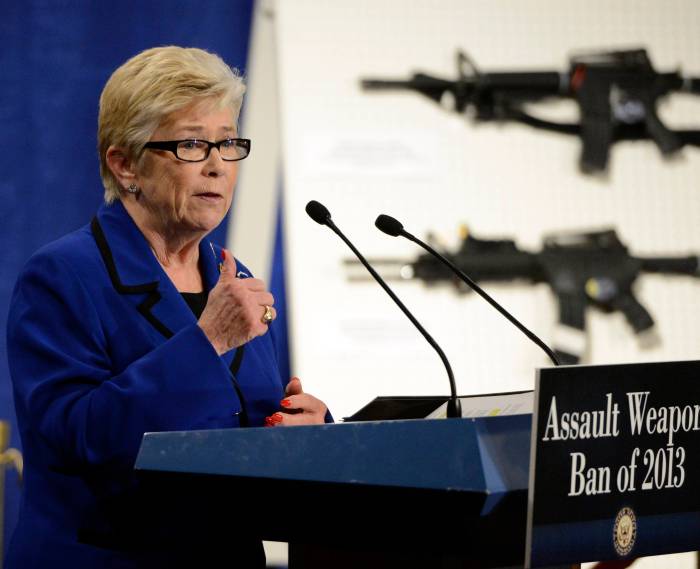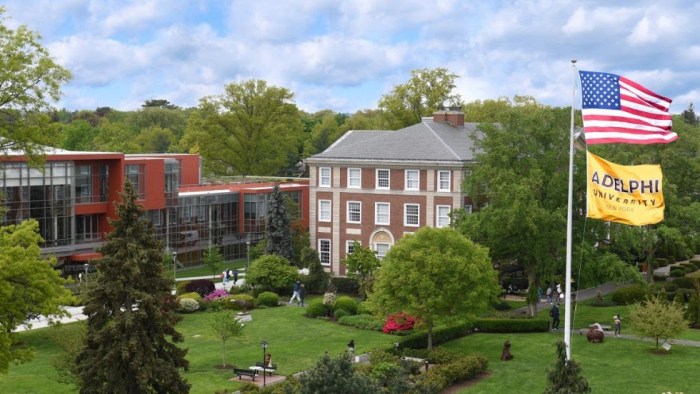Autism advocate
Dr. Temple Grandin
lectures at Adelphi
With autism being such a hot button topic on Long Island, it was no surprise to see more than 1200 audience members fill Adelphi University’s Center Ballroom to hear Dr. Temple Grandin’s lecture, “The World Needs All Kinds of Minds,” on Wednesday, Sept. 24. The demand to see her was so great that her appearance was streamed live to the Performing Arts Center Concert Hall and Manhattan Center.
A respected and accomplished expert on the topic of autism, Dr. Grandin’s personal perspective has helped her make a significant impact on the way this disorder is viewed today. By the time Grandin was four, she had been diagnosed with autism and pressured to be institutionalized, which was the standard approach to treatment for autism and Aspergers in the early 1950s.
By 1990, Temple Grandin had earned a bachelor’s degree in psychology from Franklin Pierce college, a master’s degree in animal science from Arizona State University and a doctoral degree in animal science from the University of Illinois at Urbana-Champaign. Now a professor of Animal Science at Colorado University for more than two decades, Dr. Grandin continues to use her photo realistic mind and memory to contribute to both the scientific and autistic world, and still speaks internationally as an advocate for the treatment, education, and support of autistic children and adults.
With a slide show called “The Autistic Brain,” Grandin explained how the autistic mind differs from others, the autism spectrum, and why those minds are necessary for our world today. Her approaches to handling these disorders include teaching hands-on activities, specialized skills, and resourceful thinking in, and out of the classroom especially where children on the spectrum are concerned. Early intervention must happen to find a child’s favorite interest as well as any special abilities and strengths. It’s a philosophy she covers extensively in her book Emergence: Labeled Autistic.
“I have read enough to know that there are still many parents, and yes, professionals too, who believe that ‘once autistic, always autistic.’ This dictum has meant sad and sorry lives for many children diagnosed, as I was in early life, as autistic,” she writes. “To these people, it is incomprehensible that the characteristics of autism can be modified and controlled. However, I feel strongly that I am living proof that they can.”
Although considered strange in her middle and high school years, Temple Grandin found a mentor through her education, who recognized her deep interests and expertise with a variety of sciences. Grandin also believes, from experience, that a strong background in manners is important, and can teach and instill certain social skills autistic people lack.
“We have to stretch these kids,” says Professor Grandin. “I’m a big believer in tuning into the kid’s interests. Get them involved in something they have shown interest in.”
Building on such strengths can be the key to success. They have allowed Granding to see things most people can’t see, allowing her to become a livestock-handling equipment designer, one of very few in the world.
Grandin argues that the world needs unique minds such as those with autism. Careers that combine engineering and art such as welding and computer programing.
“Autism is part of who I am, but being a college professor comes first,” she declared.
Temple suggested that parents are being too tolerate of bullying, laziness, and is concerned that autistic children are getting too hung up on the label given to them along with their diagnosis.
“I had worked cleaning horse stalls, painting signs, interning at research lab, and a had sewing job all before I entered college,” Grandin explained. “You need to have a ton of work experience before you graduate college. I’m seeing college graduates without any work skills. You need to get up in the morning, and you have to get it done.”
In attendance, was Bridges to Adelphi, a program that help students with Asperger’s, autism, and other social anxiety disorders. Bridges aims to enhance the quality of college life for students with nonverbal learning disabilities through aid in with organizational, time management, social and independent living skills.
Student members of Bridges as well as other members of the audience were given the opportunity to query Dr. Grandin once the slideshow ended. Questions ranged from advice for helping autistic children in and out of the classroom, to how to handle criticism and confrontation from others off the spectrum.
“This presentation really spoke to students and their families about what they can do to be successful,” said Bridges to Adelphi Director Mark Nagler.


































